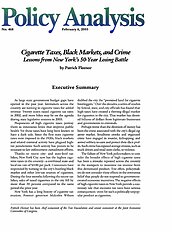Proponents of high cigarette taxes portray them as innocuous levies that improve public health. Yet those taxes have long been known to have a dark side. Since the first state cigarette taxes were imposed in the 1920s, black markets and related criminal activity have plagued high-tax jurisdictions. Such activity has proven to be resistant to law enforcement curtailment efforts.
Thanks to recent city- and state-level tax hikes, New York City now has the highest cigarette taxes in the country–a combined state and local tax rate of $3.00 per pack. Consumers have responded by turning to the city’s bustling black market and other low-tax sources of cigarettes. During the four months following the recent tax hikes, sales of taxed cigarettes in the city fell by more than 50 percent compared to the same period the prior year.
New York has a long history of cigarette tax evasion. Former governor Malcolm Wilson dubbed the city the “promised land for cigarette bootleggers.” Over the decades, a series of studies by federal, state, and city officials has found that high taxes have created a thriving illegal market for cigarettes in the city. That market has diverted billions of dollars from legitimate businesses and governments to criminals.
Perhaps worse than the diversion of money has been the crime associated with the city’s illegal cigarette market. Smalltime crooks and organized crime have engaged in murder, kidnapping, and armed robbery to earn and protect their illicit profits. Such crime has exposed average citizens, such as truck drivers and retail store clerks, to violence.
The failure of New York policymakers to consider the broader effects of high cigarette taxes has been a mistake repeated across the country in the stampede to maximize tax revenue from this demonized product. Too often, policymakers do not consider these effects in the erroneous belief that people do not respond to government-created economic incentives. The negative effects of high cigarette taxes in New York provide a cautionary tale that excessive tax rates have serious consequences–even for such a politically unpopular product as cigarettes.

